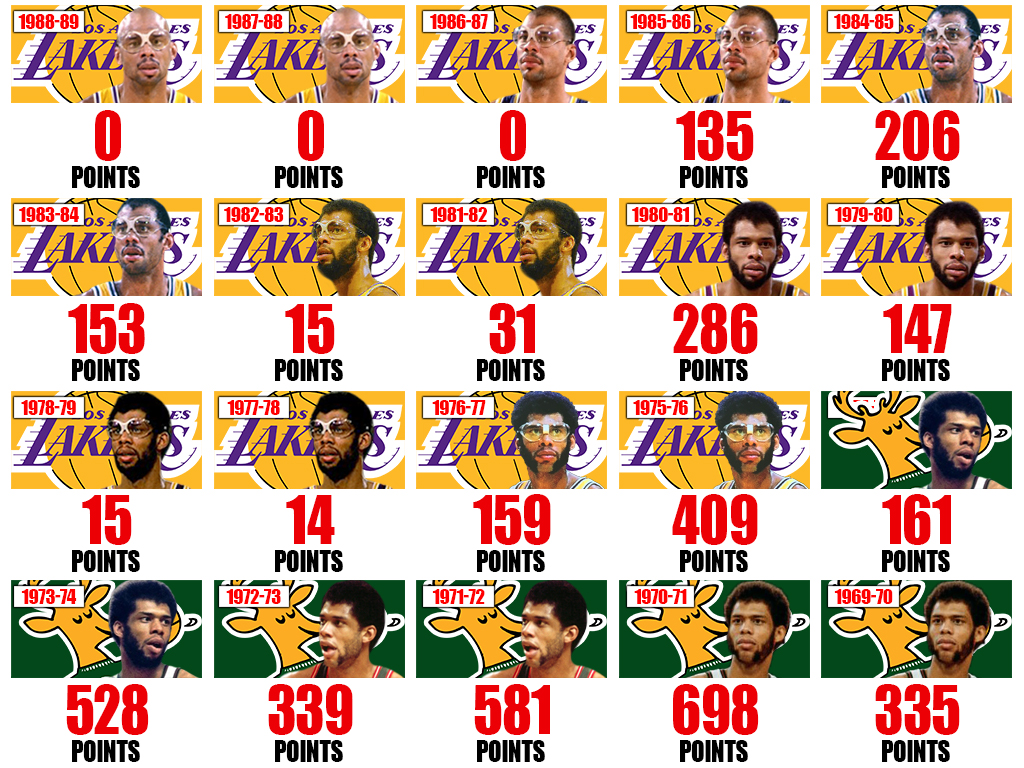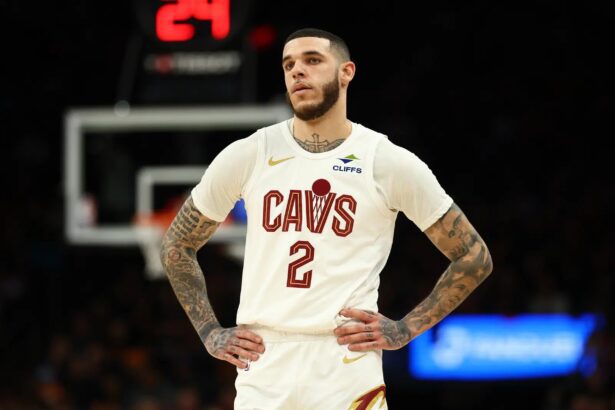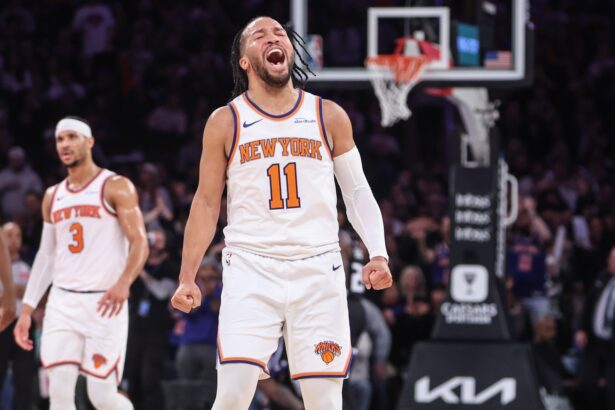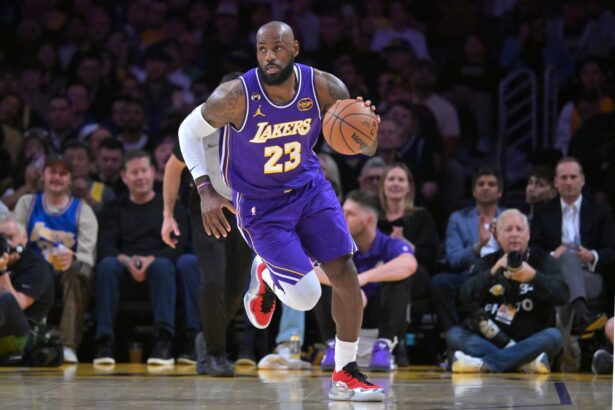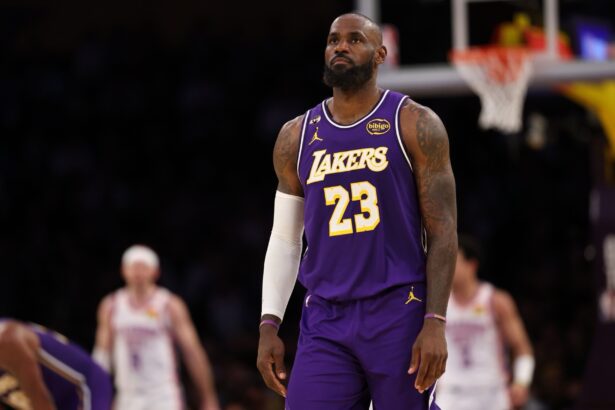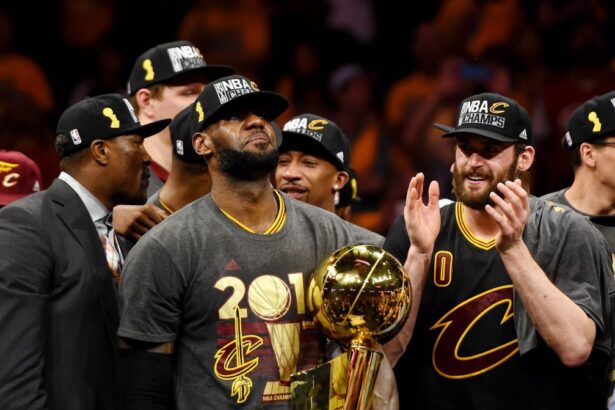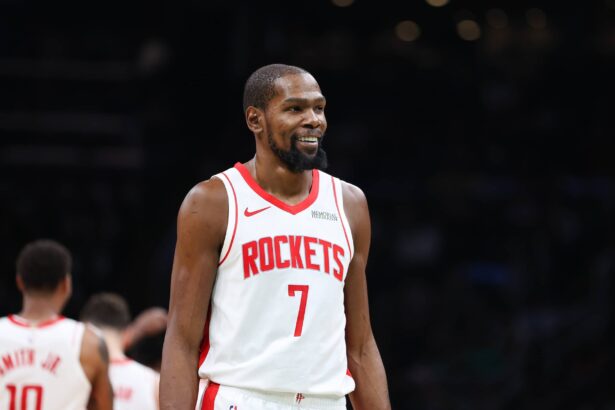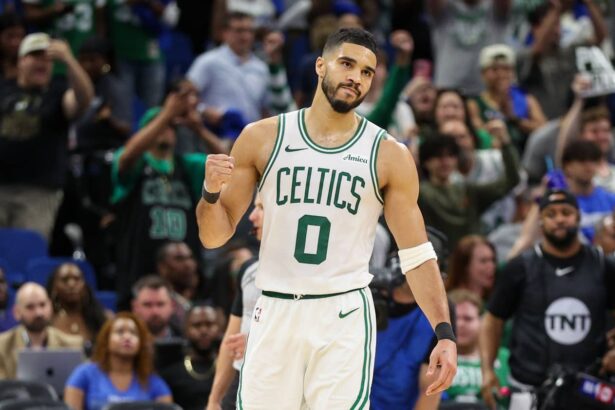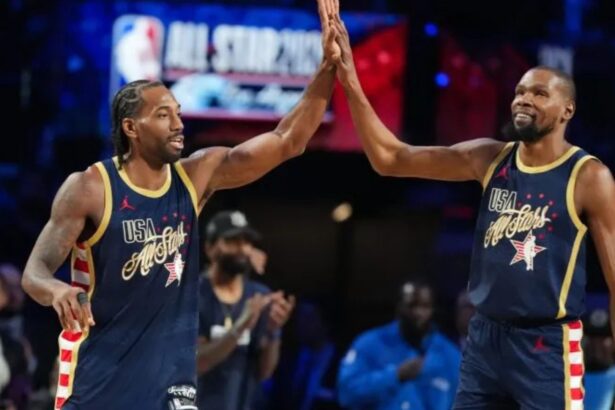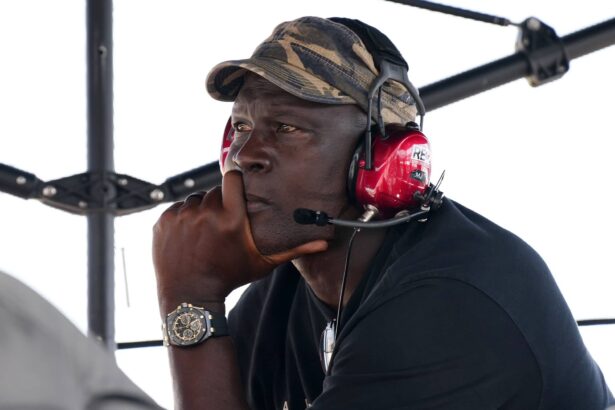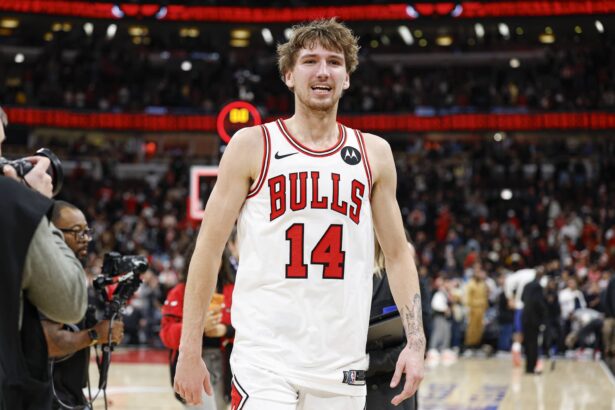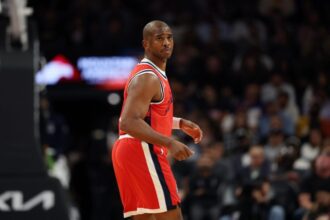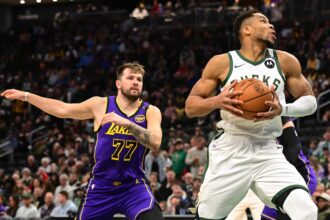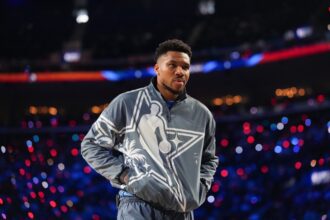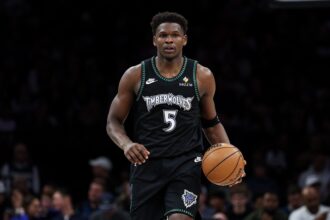Kareem Abdul-Jabbar is considered the greatest center of all time, in terms of individual and team success. He captured an impressive 6 MVP awards, 2 Finals MVP awards, and 2 scoring titles. In terms of team accolades, Kareem Abdul-Jabbar won 6 championships with two different teams and also won a Finals MVP award with each team. Not to mention, Abdul-Jabbar ranks 1st all-time in total points scored, although this record is in jeopardy thanks to the late career surge by LeBron James. But his impact came beyond simply numbers and accolades because he also terrorized defense with the utmost skill in terms of getting the ball in the basket.
- 1969-70 – 335 Points (MVP Race Finish: 3rd)
- 1970-71: 698 Points (MVP Race Finish: 1st)
- 1971-72: 581 Points (MVP Race Finish: 1st)
- 1972-73: 339 Points (MVP Race Finish: 2nd)
- 1973-74: 528 Points (MVP Race Finish: 1st)
- 1974-75: 161 Points (MVP Race Finish: 5th)
- 1975-76: 409 Points (MVP Race Finish: 1st)
- 1976-77: 159 Points (MVP Race Finish: 1st)
- 1977-78: 14 Points (MVP Race Finish: 4th)
- 1978-79: 15 Points (MVP Race Finish: 4th)
- 1979-80: 147 Points (MVP Race Finish: 1st)
- 1980-81: 286 Points (MVP Race Finish: 3rd)
- 1981-82: 31 Points (MVP Race Finish: 10th)
- 1982-83: 15 Points (MVP Race Finish: 10th)
- 1983-84: 153 Points (MVP Race Finish: 4th)
- 1984-85: 206 Points (MVP Race Finish: 4th)
- 1985-86: 135 Points (MVP Race Finish: 5th)
- 1986-87: 0 Points (MVP Race Finish: N/A)
- 1987-88: 0 Points (MVP Race Finish: N/A)
- 1988-89: 0 Points (MVP Race Finish: N/A)
- Next
- Michael Jordan’s MVP Points Per Season: The GOAT Won 5 MVP Awards And Came Second 4 Times
- LeBron James’ MVP Points Per Season: King James Deserved More Than Just 4 MVP Awards
- The NBA Players Who Have Won The Most MVP Awards: Kareem Abdul-Jabbar Is The Ultimate Leader With 6 Trophies
- Shaquille O’Neal vs. Kareem Abdul-Jabbar Comparison: Who Is The Greater Center?
- NBA Champions With The Best Regular Season Records: 1995-96 Chicago Bulls Are Still Unbeatable With 72-10
Because he consistently made the right move at the appropriate moment, Kareem’s intangibles were just on another level. Abdul-Jabbar possessed the size to shoot over any defender and set up any shot he wanted, and it did not matter whether he was young or older. Of course, that was thanks to the patented sky hook shot that was simply unguardable, unstoppable, and unblockable. With his scoring prowess, Kareem frequently forced the outcome of games, and he never seemed to back down, no matter who the opposition was. Defensively, Abdul-Jabbar got the job done by dominating on defense en route to his 11 All-Defensive Team selections. In every facet of the game, Abdul-Jabbar simply dominated the league.
Kareem managed to win 6 MVP awards in his career, which ranks 1st all-time ahead of Michael Jordan and Bill Russell, who both won 5 MVPs. In honor of Abdul-Jabbar and his incredible resume, it is time to go through every season of Abdul-Jabbar’s career to allocate the total number of MVP points earned and his MVP race finish. His dominance across the league for as long as he played is second to none, and it is time to go back in time to revisit the elite resume that saw him gain a ton of MVP votes en route to 6 MVP awards.
1969-70 – 335 Points (MVP Race Finish: 3rd)
Season Statistics: 28.8 PPG, 14.5 RPG, 4.1 APG
Kareem Abdul-Jabbar had one of the greatest rookie campaigns in NBA history, even if he came in with a ton of pressure on his shoulders. The center averaged 28.8 PPG and 14.5 RPG, while also showing the capability to dominate defenses. In some ways, fans and media members were already believing the best player in the game had arrived. Unsurprisingly, Abdul-Jabbar accumulated MVP votes and managed to finish 3rd in the MVP race as a rookie. Of course, the big man won the Rookie of the Year award.
The Milwaukee Bucks went 56-26 behind Abdul-Jabbar’s Rookie of the Year campaign when he posted spectacular two-way statistics while also shooting 51.8% from the field. Amazingly, the big man made the Eastern Division Finals and fell just short of the NBA Finals as a young man with no experience.
1970-71: 698 Points (MVP Race Finish: 1st)
Season Statistics: 31.7 PPG, 16.0 RPG, 3.3 APG
A year after making the playoffs with Abdul-Jabbar on the squad as the best rookie in the league, the Milwaukee Bucks once again had their star for the season. Kareem went out with a bang, competing in 82 games. The center’s numbers were off the charts great, as he posted 31.7 PPG and 16.0 RPG while leading the Milwaukee Bucks to a very strong record in the East at 66-16.
The center led the league in scoring, win shares, and also won the coveted MVP award. Kareem and his sky hook shot was simply devastating because no team could stop the player when he was down low. The Bucks ended up sweeping the Bullets in the NBA Finals, which capped off an all-time great MVP season by Abdul-Jabbar.
1971-72: 581 Points (MVP Race Finish: 1st)
Season Statistics: 34.8 PPG, 16.6 RPG, 4.6 APG
Kareem Abdul-Jabbar followed up an incredible ending to a season that won a championship with another spectacular showing. The center averaged 34.8 PPG, winning his second scoring title and destroying the rest of the competition. Unsurprisingly, the center led the league in win shares and once again made the Conference Finals although he could not add a second championship just yet.
Abdul-Jabbar’s incredible season offensively gave him the MVP award, as that honor went to the single most dominant force in the NBA. Sure, Wilt Chamberlain was going ballistic with his numbers, but Kareem was making his team win games convincingly. No doubt, winning has to be the biggest factor in a player’s MVP case. Kareem earned 581 points which was ahead of Jerry West (393 MVP points).
1972-73: 339 Points (MVP Race Finish: 2nd)
Season Statistics: 30.2 PPG, 16.1 RPG, 5.0 APG
Kareem’s career was off to a fantastic start, winning 2 MVP awards and finishing second once already. In 1973, he finished second again. Kareem was dominant on both ends of the floor, scoring the ball at an elite clip while also doing everything on defense. Abdul-Jabbar dominated the paint, shut down opposing guards, and even blocked shots. In one-on-one situations, Abdul-Jabbar was suffocating while also scoring the ball at an unstoppable level on offense.
Kareem came close to winning his third MVP award by posting 30.2 PPG, 16.1 RPG, 5.0 APG while shooting 55.4% from the field. In nearly every way, Abdul-Jabbar’s 1973 season might be one in which he could have had a case for actually being the MVP despite finishing second. Abdul-Jabbar’s 339 MVP votes were behind Dave Cowens, who had 444 MVP votes as a member of the Boston Celtics.
1973-74: 528 Points (MVP Race Finish: 1st)
Season Statistics: 27.0 PPG, 14.5 RPG, 4.8 APG, 1.4 SPG, 3.5 BPG
Kareem Abdul-Jabbar didn’t quite become the most dominant player in the league in terms of winning championships until he had Magic by his side, but he came close year after year while dominating the paint. Kareem’s stat line during the 1974 season was incredibly complete, especially since the center was required to do so much. Whether scoring, blocking shots or rebounding, Kareem did it all.
As expected, Kareem won his third MVP award, finishing first ahead of Bob McAdoo, who posted 30.6 PPG and 15.1 RPG. McAdoo had 451 MVP votes, so he was not too far off from the legendary center. Kareem had the edge in the end, capturing the MVP and also losing in 7 games to the Boston Celtics in the NBA Finals.
1974-75: 161 Points (MVP Race Finish: 5th)
Season Statistics: 30.0 PPG, 14.0 RPG, 4.1 APG, 1.0 SPG, 3.3 BPG
Kareem Abdul-Jabbar had the lowest MVP finish of his career to date in 1975 when he posted 30.0 PPG and 14.0 RPG to finish 5th in the MVP race. He fell in fifth place behind winner Bob McAdoo, Dave Cowens, Elvin Hayes, and Rick Barry. The superstar center had the numbers to win the MVP award, but not the narrative as the Bucks finished 38-44 with the big man only playing in 65 games.
Kareem Abdul-Jabbar averaged 30.0 PPG but also posted 3.3 BPG, which led all players. No doubt, Kareem began staking his claim as possibly the most dominant talent we had seen. But again, not winning enough games does hurt a player’s MVP chances, which is why he could not quite crack the top 3 in MVP voting with the Milwaukee Bucks.
1975-76: 409 Points (MVP Race Finish: 1st)
Season Statistics: 27.7 PPG, 16.9 RPG, 5.0 APG, 1.5 SPG, 4.1 BPG
In the 1975–76 NBA season, Kareem Abdul-Jabbar won his first rebounding title, led the league in blocks, and by the end of the year, had established himself as one of the all-time greats. That results in an exceptionally prosperous season, one that Abdul-Jabbar would even acknowledge as one of his best ever on defense. Abdul-Jabbar was simply elite on both ends of the floor.
Being a score-first player, scoring 27.7 PPG on 52.9% field goal shooting is remarkable. However, Abdul-Jabbar made it appear even more simple as soon as he had Magic Johnson alongside him full-time. It would not be long before Magic would be alongside him, but Kareem was the man for the Los Angeles Lakers for now, as he won another MVP award.
1976-77: 159 Points (MVP Race Finish: 1st)
Season Statistics: 26.2 PPG, 13.3 RPG, 3.9 APG, 1.2 SPG, 3.2 BPG
The center’s 1976-77 campaign saw him win yet another MVP award as he led the NBA in win shares. Once more, Kareem Abdul-Jabbar averaged over 26 points per game, making 57.9% of his field goal attempts and around 70% of his free throw attempts. Considering that Kareem would not stop there as his career would not be close to being done, it is getting harder to express just how magnificent he was.
The Lakers finished with the first seed in the Western Conference and made it to the Western Conference Finals, although it was a losing effort. Kareem was dominating the scoring charts and even in rebounding and defense, but it was not yet resulting in championship success. But in individual success, Kareem was on point.
1977-78: 14 Points (MVP Race Finish: 4th)
Season Statistics: 25.8 PPG, 12.9 RPG, 4.3 APG, 1.7 SPG, 3.0 BPG
The center had another stellar season, scoring 25.8 points per game on 55.0% of his shots. There was absolutely no comparison between the center and anyone else in terms of how well he scored the ball and also did other things well inside the paint, from rebounding to playing interior defense.
Abdul-Jabbar made it look easy, so it was amazing how frequently he averaged more than 25 points per game throughout his career. The center did not end the season with a championship again, as the Lakers lost in the First Round in 3 games. But in terms of skill and dominance, Kareem was good enough to finish 4th in the MVP race.
1978-79: 15 Points (MVP Race Finish: 4th)
Season Statistics: 23.8 PPG, 12.8 RPG, 5.4 APG, 1.0 SPG, 4.0 BPG
Kareem finished 4th in the MVP race because his scoring numbers (and numbers all around) were not quite at the human level as we had been seeing. He scored 23.8 PPG on 57.7% shooting so his efficiency was there, but he did not dominate other ends of the floor at a historic level except when it came to his shot-blocking.
The center averaged 4.0 BPG, which led the NBA for the third time in his career, and he did lead the league in win shares yet again. The Lakers made it to the second round of the playoffs, losing in 5 games to the Seattle SuperSonics. Kareem had a knack for scoring inside and playing defense, so his impact as an individual was still there.
1979-80: 147 Points (MVP Race Finish: 1st)
Season Statistics: 24.8 PPG, 10.8 RPG, 4.5 APG, 1.0 SPG, 3.4 BPG
Kareem Abdul-Jabbar’s 1980 season is considered somewhat critical because the center played 82 games following the addition of rookie Magic Johnson. The center was spectacular in the regular season, averaging 24.8 PPG, 10.8 RPG, 4.5 APG, and 3.4 BPG while shooting 60.4% from the field. Again, Kareem led the NBA in blocks thanks to another spectacular stat line.
Abdul-Jabbar earned the most MVP votes because it was amazing to see the center back in action and winning games with the Lakers. With a rookie Magic Johnson posting 18.0 PPG, 7.7 RPG, and 7.3 APG, Kareem had a point guard who was feeding him the rock in important positions while also leading the team alongside him.
1980-81: 286 Points (MVP Race Finish: 3rd)
Season Statistics: 26.2 PPG, 10.3 RPG, 3.4 APG, 0.7 SPG, 2.9 BPG
By leading the Los Angeles Lakers to the playoffs again with a 54-28 record, Kareem Abdul-Jabbar earned the right to compete for the MVP award again. Abdul-Jabbar averaged 26.2 PPG for the year while shooting 57.4% from the field and 76.6% from the free-throw line. Even at age 33, with a ton of basketball played, Kareem was not slowing down in terms of dominating the court on both ends.
Kareem came to winning the MVP award because he was so phenomenally effective throughout the year and the greatest player on the best squad. With Magic alongside him, the Los Angeles Lakers finished with a 54-28 record as the team made it to the first round but lost in only 3 games. By now, Kareem was looking for his third NBA championship.
1981-82: 31 Points (MVP Race Finish: 10th)
Season Statistics: 23.9 PPG, 8.7 RPG, 3.0 APG, 0.8 SPG, 2.7 BPG
Kareem Abdul-Jabbar was not quite at his best, as the 1982 season could be the “worst” of his career, despite the big man posting solid numbers across the board. The superstar center was finally surpassed by Magic Johnson as the best player on his team, with the point guard finishing above him in the MVP race.
Magic finished 8th in the MVP race and led the Los Angeles Lakers to a solid 57-25 record and an NBA championship at the end of the year. The point guard was younger, more athletic, and more capable of impacting the game alongside an older and slightly less mobile big man. Kareem, at age 34, was still dominant but not at the superstar level we had come accustomed to.
1982-83: 15 Points (MVP Race Finish: 10th)
Season Statistics: 21.8 PPG, 7.5 RPG, 2.5 APG, 0.8 SPG, 2.2 BPG
Kareem Abdul-Jabbar averaged 21.8 PPG and 7.5 RPG, solid numbers that were indicative that the superstar center was officially the second-best player on the team behind Magic Johnson. Magic led the way, posting 16.8 PPG, 8.6 RPG, and 10.5 APG while finishing 3rd in the MVP race. Kareem was efficient, shooting 58.8% from the floor, so that was a major plus.
The Lakers ended up with a 58-24 record as the team made it to the NBA Finals against the Philadelphia 76ers at the end of the year. The Lakers could not quite win a game, as they lost in a 4-game sweep. But during the season, Magic and Kareem led the Lakers to a very solid record, which is why the center earned some MVP votes when he did not have a real chance to challenge Moses Malone for the award.
1983-84: 153 Points (MVP Race Finish: 4th)
Season Statistics: 21.5 PPG, 7.3 RPG, 2.6 APG, 0.7 SPG, 1.8 BPG
Even at age 36, Kareem was good enough to finish 4th in the MVP race behind the winner Larry Bird, Bernard King, and his own teammate Magic Johnson. The superstar center was solid shooting the ball as he averaged 57.8% from the court. Thanks to the sky hook, Kareem could score the ball anytime he wanted, which is why he was still impactful on the court.
The Los Angeles Lakers finished with a 54-28 record thanks to their dynamic duo, and even if Kareem was slowing down, he was still effective enough to be a paint defender and scorer. It is only expected that a player slows down his production with age, so Kareem, at age 36, was not at his best, although his impact was important for the Lakers’ championship bid. Unfortunately, a championship was not won yet.
1984-85: 206 Points (MVP Race Finish: 4th)
Season Statistics: 22.0 PPG, 7.9 RPG, 3.2 APG, 0.8 SPG, 2.1 BPG
Abdul-Jabbar was no longer the go-to player for the Lakers as that honor belonged to Magic Johnson, but he was still posting above 20 PPG on over 50% from the floor. In fact, the center averaged 59.9% from the court, which was a major reason why the player managed to finish 4th in the MVP race behind the winner Larry Bird, Magic Johnson, and Moses Malone.
As expected, Kareem Abdul-Jabbar at age 37 was unable to accumulate enough MVP points to actually win it all, although he finished 4th in the race. No doubt, seeing Abdul-Jabbar earn another All-Star Team appearance and having him play 79 games was a perfect combination. Kareem was already the most impactful center we had ever seen, so adding All-Star appearances and continuing to score was impressive to witness. Of course, Abdul-Jabbar would win his 4th NBA championship at the end of the year.
1985-86: 135 Points (MVP Race Finish: 5th)
Season Statistics: 23.4 PPG, 6.1 RPG, 3.5 APG, 0.8 SPG, 1.6 BPG
Abdul-Jabbar was no longer the go-to player for the Lakers as mentioned, but he was still posting above 20 PPG on over 50% from the floor. In fact, the center averaged 56.4% from the court, which was a major reason why the player managed to finish 5th in the MVP race despite being 38 years old. At that age, a player should not even be in the mix, but Kareem had more votes than Charles Barkley, Isiah Thomas, and Sidney Moncrief, among others.
The center was always effective thanks to the sky hook, as he could let the shot loose whenever he wanted because he was still 7’2” tall with extremely long arms. The big man simply knew how to be effective when it came to scoring the ball, and that is why he managed to earn an impressive 135 MVP points.
1986-87: 0 Points (MVP Race Finish: N/A)
Season Statistics: 17.5 PPG, 6.7 RPG, 2.6 APG, 0.6 SPG, 1.2 BPG
Finally, Kareem did not have any MVP votes during the season. It was amazing to see the superstar center consistently compete for the MVP award year after year, capturing 6 of them in his career and coming close a handful of times. In 1987, the big man had zero shot of winning the MVP award as that honor went to Magic Johnson.
Kareem added his 5th NBA title thanks to Magic’s leadership all year long, with the big man acting as a go-to sky hook scorer and paint enforcer. Kareem averaged under 20 PPG for the first time in his career, but no doubt, he was still a consistent presence in the paint. The Lakers benefitted, winning the NBA title at the end of the season.
1987-88: 0 Points (MVP Race Finish: N/A)
Season Statistics: 14.6 PPG, 6.0 RPG, 1.7 APG, 0.6 SPG, 1.2 BPG
Kareem was 40 years old, so his numbers suffered a steep decline. But he still posted good enough numbers to make yet another All-Star Team as a member of the Los Angeles Lakers. Thanks to the sky hook shot, Kareem was always capable of letting the shot loose and terrorizing defenses. Of course, the big man would win his 6th NBA title.
Alongside Magic Johnson, Kareem was supremely effective on the floor for the Lakers because he could score while also providing leadership and a defensive presence. The center was solid on the court in every way, but he could not earn any MVP votes because his numbers obviously did not reflect that he was the best player in the world. That belonged to Michael Jordan, who won the MVP award, but also Larry Bird and Magic Johnson were still the faces of the league.
1988-89: 0 Points (MVP Race Finish: N/A)
Season Statistics: 10.1 PPG, 4.5 RPG, 1.0 APG, 0.5 SPG, 1.1 BPG
At age 41, we witnessed the final season of Kareem’s illustrious career because he made his 19th All-Star Team and added some more points to his all-time great total. The superstar center averaged 10.1 PPG and 4.5 RPG on 47.5% shooting from the field, numbers indicative of a player in his twilight years.
Unfortunately for Kareem, he could not add a 7th championship before his retirement because the Los Angeles Lakers finished with a 57-25 record as the team made it to the NBA Finals but lost in 4 games to the Detroit Pistons. Time would be up for Kareem, and we got to see the sky hook shot terrorize defenders a few more times before he rode off into the sunset.

